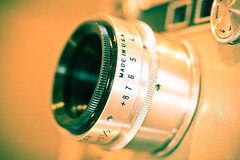Difference between revisions of "Argus Match-Matic C3"
m (fixed wiki link) |
m |
||
| Line 15: | Line 15: | ||
Calculating flashbulb exposures was also "simplified." With the shutter set at the indicated #5 mark, blue "Flash Finder" numbers corresponding to different distances could be read off the rangefinder wheel; the lens opening was set to match. This system was calibrated for Kodachrome slide film and #25B blue flashbulbs; other film & bulb combinations required adding or subtracting a conversion factor. | Calculating flashbulb exposures was also "simplified." With the shutter set at the indicated #5 mark, blue "Flash Finder" numbers corresponding to different distances could be read off the rangefinder wheel; the lens opening was set to match. This system was calibrated for Kodachrome slide film and #25B blue flashbulbs; other film & bulb combinations required adding or subtracting a conversion factor. | ||
| − | The Match-Matic was supplied with the standard 3-element 50mm f/3.5 Cintar lens, but with a | + | The Match-Matic was supplied with the standard 3-element 50mm f/3.5 Cintar lens, but with a [[Series filters|Series V]] retaining ring to accept drop-in filters. |
Revision as of 20:17, 19 February 2011

|
| Argus C3 Match-Matic with original meter image by John Kratz (Image rights) |
The two-tone leatherette C3 Match-Matic was produced between 1958 and 1966, and its retro styling still appeals to many collectors' eyes today. But beneath the skin, the Match-Matic is largely the same old Argus "brick" sold since 1938 (and discussed further in the Argus C3 article.)
The cosmetic makeover may been influenced by 1950s automobile styling from Detroit, a near neighbor to the Argus factory. Functionally, the significant change was an attempt to "simplify" exposure settings, by removing the familiar f/stop and shutter speed numbering. Instead, a dedicated clip-in meter provided EV readings; the user was expected to mentally add integers on the shutter and aperture dials until the total equaled the desired EV value. In addition to the numerals, the front dial indicates zones for "scenes" (slower) and "action" (briefer) shutter speeds. (The 8 corresponds to the C3's top shutter speed of 1/300 sec.)
The system becomes more problematic if the meter has gone missing, or has stopped working (after 50 years, either is quite possible).
Calculating flashbulb exposures was also "simplified." With the shutter set at the indicated #5 mark, blue "Flash Finder" numbers corresponding to different distances could be read off the rangefinder wheel; the lens opening was set to match. This system was calibrated for Kodachrome slide film and #25B blue flashbulbs; other film & bulb combinations required adding or subtracting a conversion factor.
The Match-Matic was supplied with the standard 3-element 50mm f/3.5 Cintar lens, but with a Series V retaining ring to accept drop-in filters.

|
| Non-standard "Match-Matic" aperture scale image by Mark Goff (Image rights) |
Links
- Argus Collectors Group
- Manual available on the Favorite Classics section of .kyphoto.com
- Argus C3 Matchmatic at www.collection-appareils.fr by Sylvain Halgand
- manual at Michael Butkus Jr.'s [1]